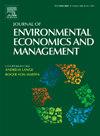2000-2020 年全球空气质量不平等
IF 5.9
3区 经济学
Q1 BUSINESS
Journal of Environmental Economics and Management
Pub Date : 2025-01-01
DOI:10.1016/j.jeem.2024.103112
引用次数: 0
摘要
空气污染在世界各地造成巨大的健康负担和经济成本。污染暴露程度在国家之间和国家内部差别很大。但空气质量不平等的程度及其轨迹尚未在全球范围内量化。我使用经济不平等指数来衡量暴露于小于2.5μm的环境细颗粒物(PM2.5)的全球不平等。我发现全球空气质量的不平等程度很高,而且还在不断加剧。全球PM2.5基尼系数从2000年的0.30上升到2020年的0.35,超过了许多国家的收入不平等水平。分解分析显示,空气质量不平等主要是由国家之间的差异造成的,而不是由国家内部的变化造成的。在PM2.5暴露水平最高的人群中,很大一部分人只生活在少数几个国家。根据全球疾病负担框架,我发现与PM2.5暴露相关的死亡率甚至比污染暴露本身更不平等。研究结果表明,对国家内部不平等的普遍关注忽视了环境正义的一个重要全球层面。本文章由计算机程序翻译,如有差异,请以英文原文为准。
Global air quality inequality over 2000–2020
Air pollution generates vast health burdens and economic costs around the world. Pollution exposure varies greatly, both between countries and within them. But the degree of air quality inequality and its’ trajectory have not been quantified at a global level. I use economic inequality indices to measure global inequality in exposure to ambient fine particles smaller than 2. (PM2.5). I find high and rising levels of global air quality inequality. The global PM2.5 Gini Index rose from 0.30 in 2000 to 0.35 in 2020, exceeding levels of income inequality in many countries. Air quality inequality is mostly driven by differences between countries and less so by variation within them, as decomposition analysis shows. A large share of those facing the highest levels of PM2.5 exposure live in only a few countries. Building on the Global Burden of Disease framework, I find that mortality associated with PM2.5 exposure is even more unequal than pollution exposure itself. The findings suggest that the common focus on inequality within countries overlooks an important global dimension of environmental justice.
求助全文
通过发布文献求助,成功后即可免费获取论文全文。
去求助
来源期刊
CiteScore
8.00
自引率
4.30%
发文量
91
期刊介绍:
The Journal of Environmental Economics and Management publishes theoretical and empirical papers devoted to specific natural resources and environmental issues. For consideration, papers should (1) contain a substantial element embodying the linkage between economic systems and environmental and natural resources systems or (2) be of substantial importance in understanding the management and/or social control of the economy in its relations with the natural environment. Although the general orientation of the journal is toward economics, interdisciplinary papers by researchers in other fields of interest to resource and environmental economists will be welcomed.

 求助内容:
求助内容: 应助结果提醒方式:
应助结果提醒方式:


